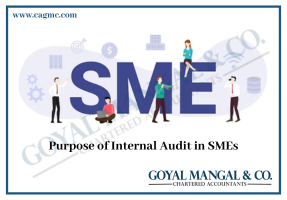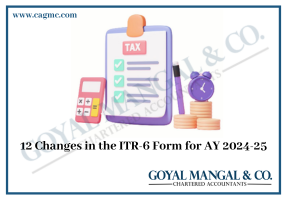
Got a stack of bills from your smaller suppliers? Hold on to your wallet, friend, because a new tax rule just made late payments sting a whole lot more. Section 43B(h) of the Income Tax Act is shaking things up, meaning delays in settling those MSME bills can now hurt your own bottom line. No more kicking the can down the road! This blog tackles everything you need to know about Section 43B(h) MSME amendment applicability and why paying your MSME suppliers promptly is no longer just good business practice, it’s tax-smart too.
Overview of Section 43B (H) of Income Tax Act, 1961
The New clause Section 43B(h) has been added in Income Tax Act, 1961 for the social and economic welfare of small and medium enterprises and to ensure the payments are made on time. Pay up on time! Section 15 of the MSME Development Act says big companies must pay smaller ones within 45 days to get tax benefits on those payments.
Late payments cost you. The tax deduction will not be allowed for the payment made to MSME vendors beyond 45 days of deadline. Think of it as helping small businesses stay healthy and giving yourself a tax break in the process. So, big companies, remember pay your MSME suppliers promptly, it’s good for their wallets and yours!
Deadline’s ticking for big companies to pay smaller ones as per Section 15 of MSME Act
According to the MSME Development Act, 2006, Section 15 provides a definition that “If a supplier provides goods or services to a buyer, the buyer must make payment by the agreed-upon date as specified in writing or, if there is no prior agreement, before the appointed day.”
As long as the duration agreed upon in writing does not surpass forty-five days from the date of acceptance or deemed acceptance, in any scenario. “The term ‘appointed day’ refers to the day that comes right after the fifteen-day period following the acceptance or deemed acceptance of goods or services by a buyer from a supplier.”
There are forms need to file like E form MSME -1.
Consequences of failing to do payment to MSME Vendor in specified timeframe.
If a buyer, who is a micro or small enterprise, cannot pay the supplier for goods or services, they will face repercussions under the Finance bill 2023. This includes the imposition of compensatory interest liability as outlined in Section 16 of the MSME Development Act, 2006. Moreover, this expense will be deemed ineligible for business purposes. The results will be:
- Interest Compensatory: If the buyer is unable to make the payment to the supplier as required by section 15, as stated in any agreement or regulation, they must still file the compound interest with monthly intervals on the amount owed from the designated day to the supplier. The interest rate should be three times the rate set by the Reserve Bank. The RBI has informed that the bank rate concerning the matter is equivalent to the current RBI repo rate.
- Interest payment prohibition: The prohibition of making interest payments as compensation to MSMEs is implemented.: The amount of interest that a buyer pays under Section 23 of the MSME Development Act, 2006, will not be considered for income tax calculation and cannot be deducted.
- Disallowance of Expenditure: Any funds that the taxpayer is responsible for paying, as well as payments to suppliers registered as micro or small enterprises, will not be approved if they fail to make payment within the specified 15-day period mentioned in the MSME Development Act, 2006.
What communities are covered by Clause (h) of Section 43B, and how are they identified according to the procedure?
If the amount owed to the Micro & Small Enterprises is the only reason, then Section 43B (H) of Income tax Act is applicable. Therefore, according to the accrual basis, the amount that the Medium Enterprise is obligated to pay is eligible for deduction.
Definition of enterprise in accordance with the MSME Development Act of 2006
An enterprise refers to a business, industrial endeavour, or any establishment, regardless of the name it goes by. It engages in the manufacturing or production of goods connected to any industry mentioned in the First Schedule of the Industries (Development and Regulation) Act, 1951 or operates in the provision or delivery of various services.
Different types of businesses according to the MSME Development Act, 2006.
The Central Government has the authority to classify any type of business, such as sole proprietorships, Hindu undivided families, associations of persons, cooperative societies, partnership firms, companies, or other legal entities, as either a micro, small, or medium enterprise. This section supersedes section 11B of the industries (Development and Regulation) Act, 1951.
This definition of types of enterprises is provided here for your convenience.
- Micro: Think of the lady selling delicious pickles from her cart. Her investment in ingredients and equipment is less than Rs. 1 crore, and her annual sales barely cross Rs. 5 crores, that is turnover is less than 5 crores. This is classified as micro enterprise.
- Small: Now picture a bookstore filled variety of books. Their investment in bookshelves and inventory might reach up to Rs. 10 crores, and their sales can go up to Rs. 50 crores. They’re a small enterprise, growing steadily and making a mark on the literary world.
- Medium: Finally, imagine a sleek electronics store, stocked with the latest gadgets. Their investment in technology and infrastructure is less then Rs. 20 crores, and their sales is less than 100 crores. They’re a medium enterprise, a driving force, employing teams and innovating with every new circuit board.
Final words
So, what’s the takeaway? Pay your MSME vendors on time! It’s good for their cash flow, good for karma, and now, thanks to Section 43B(h), good for your tax bill too. Remember, a healthy ecosystem starts with fair play, and with this new rule, the playing field just got a bit more level. So, let’s support our small businesses, keep everyone happy, and watch our own wallets blossom!







